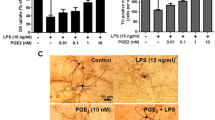Abstract.
Upon immune challenge the brain launches a wide range of responses, such as fever, anorexia, and hyperalgesia that serve to maintain homeostasis. While these responses are adaptive during acute infections, they may be destructive during chronic inflammatory conditions. Research performed during the last decade has given us insight into how the brain monitors the presence of a peripheral inflammation and the mechanisms underlying the brain-mediated acute-phase reactions. Here we give a brief review on this subject, with focus on the role of prostaglandin E2 produced in cells associated with the blood-brain barrier in immune-to-brain signaling. The recent advances in this field have not only elucidated the mechanisms behind the anti-pyretic and anti-hyperalgesic effects of cyclooxygenase inhibitors, but have also identified novel and more-selective potential drug targets.
Similar content being viewed by others
Author information
Authors and Affiliations
Additional information
Electronic Publication
Rights and permissions
About this article
Cite this article
Engblom, D., Ek, M., Saha, S. et al. Prostaglandins as inflammatory messengers across the blood-brain barrier. J Mol Med 80, 5–15 (2002). https://doi.org/10.1007/s00109-001-0289-z
Received:
Accepted:
Published:
Issue Date:
DOI: https://doi.org/10.1007/s00109-001-0289-z




